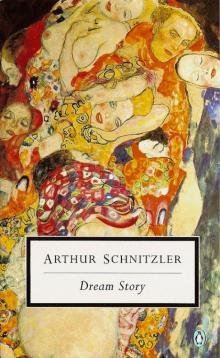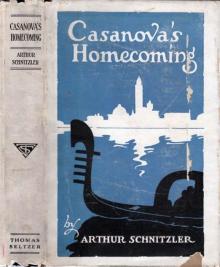- Home
- Arthur Schnitzler
Dream Story
Dream Story Read online
Arthur Schnitzler
RHAPSODY
A DREAM NOVEL
Translated from the German by
OTTO P. SCHINNERER
RHAPSODY
1
"TWENTY-FOUR brown-skinned slaves rowed the splendid galley which was to bring Prince Amgiad to the palace of the caliph. The Prince, wrapped in his purple cloak, lay alone on the deck under the dark-blue, starry sky, and his gaze—"
So far the little girl had read aloud. Then, suddenly, her eyelids drooped. Her parents looked at each other and smiled. Fridolin bent down, kissed her blond hair and closed the book which was lying on the untidy table. The child looked up as if caught at some mischief.
"It's nine o'clock," her father said, "and time you were in bed." Albertina also bent over her, and as her hand met her husband's on the beloved forehead, they looked at each other with a tender smile not meant for the child. The governess entered and asked the little girl to say good-night. She got up obediently, kissed her father and mother and walked out quietly hand in hand with the young woman. Fridolin and Albertina, left alone under the reddish glow of the hanging-lamp, continued the conversation they had begun before supper.
It dealt with their experiences the night before at the masquerade ball. They had decided to attend it just before the end of the carnival period, as their first one of the season. No sooner had Fridolin entered the ball-room than he was greeted, like a long lost friend, by two women in red dominoes. He had no idea who they were, although they were unusually well-informed about many affairs of his student days and internship. They had invited him into a box with great friendliness, but had left again with the promise that they would soon return without masks. When they did not appear, he became impatient and went down to the ball-room floor hoping to meet them again, but eagerly as he scanned the room, he could not see them anywhere. Instead, however, another woman unexpectedly took his arm. It was his wife. She had just freed herself from the company of a stranger whose blase manner and apparently Polish accent had at first charmed her. Suddenly he had offended her--frightened her by a rather common and impertinent remark. Fridolin and Albertina were glad to have escaped from a disappointingly commonplace masquerade prank, and soon sat like two lovers, among the other couples, in the buffet, eating oysters and drinking champagne. They chatted gaily, as though they had just made each other's acquaintance, acting a comedy of courting, bashful resistance, seduction and surrender. After driving home quickly through the snowy winter night, they sank into each other's arms and were more blissful in their ardent love than they had been for a long time. The gray of morning awakened them only too soon. Fridolin's profession summoned him to his patients at an early hour, while Albertina would not stay in bed longer because of her duties as housewife and mother. So the ensuing hours passed, soberly and predetermined, in daily routine and work, and the events of the night before, both those at the beginning and at the end, had faded.
But now that the day's work was done— the child had gone to bed and no disturbance was likely—the shadowy forms of the masquerade, the melancholy stranger and the red dominoes, rose again into reality. And all at once those insignificant events were imbued, magically and painfully, with the deceptive glow of neglected opportunities. Harmless but probing questions, and sly, ambiguous answers were exchanged. Neither failed to notice that the other was not absolutely honest, and so they became slightly vindictive. They exaggerated the degree of attraction that their unknown partners at the ball had exerted upon them while each made fun of the other's tendencies to jealousy and denied his own. Soon, their light conversation about the trifling matters of the night before changed into a more serious discussion of those hidden, scarcely suspected wishes, which can produce dangerous whirlpools even in the serenest and purest soul. They spoke of those mysterious regions of which they were hardly conscious but toward which the incomprehensible wind of fate might some day drive them, even if only in their dreams. For though they were united in thought and feeling, they knew that the preceding day had not been the first time that the spirit of adventure, freedom and danger had beckoned them. Uneasy, and tormenting themselves, each sought with disingenuous curiosity to draw out confessions from the other. Anxiously, they searched within themselves for some indifferent fact, or trifling experience, which might express the inexpressible, and the honest confession of which might relieve them of the strain and the suspicion which were becoming unbearable.
Whether Albertina was more impatient, more honest or more kind-hearted of the two, it was she who first summoned the courage for a frank confession. She asked Fridolin in a rather uncertain voice whether he remembered the young man who—last summer at the seashore in Denmark—had been sitting one evening with two other officers at an adjoining table. He had received a telegram during dinner, whereupon he had hastily said "good-bye" to his friends.
Fridolin nodded. "What about him?" he asked.
"I'd already seen him in the morning," she replied, "as he was hurrying up the stairs in the hotel with his yellow hand-bag. He looked at me as he passed, but didn't stop until he had gone a few more steps. Then he turned and our eyes met. He didn't smile; in fact, it seemed to me that he scowled. I suppose I did the same, for I was very much stirred. That whole day I lay on the beach, lost in dreams. Had he called me—I thought—I could not have resisted. I thought I was ready for anything. I had practically resolved to give up you, the child, my future, and at the same time —if you can understand it?—you were dearer to me than ever. That same afternoon—surely you remember—we discussed many things very intimately, among others our common future, and our child. At sunset you and I were sitting on the balcony, when, down below on the beach, he passed without looking up. I was extremely thrilled to see him, but I stroked your forehead and kissed your hair, and my love for you was both sorrowful and compassionate. That evening at dinner I wore a white rose and you yourself said I was very beautiful. Perhaps it wasn't mere chance that the stranger and his friends sat near us. He didn't look at me, but I considered getting up, walking over to him and saying: Here I am, my beloved for whom I have waited —take me. At that moment the telegram was handed to him. He read it, turned pale, whispered a few words to the younger of the two officers—and glancing at me mysteriously he left the room."
"And then?" Fridolin asked dryly when she stopped.
"That is all. I remember that I woke the next morning with a restless anxiety. I don't know whether I was afraid that he had left or that he might still be there. But when he didn't appear at noon, I breathed a sigh of relief. Don't ask any more, Fridolin. I've told you the whole truth. And you, too, had some sort of experience at the seashore—I know it."
Fridolin rose, walked up and down the room several times and then said: "You're right." He was standing at the window, his face in shadow and in a hoarse and slightly hostile voice he began: "In the morning, sometimes very early before you got up, I used to stroll along the beach, out beyond the town. Even at that hour the sun was always shining over the sea, bright and strong. Out there on the beach, as you know, were cottages, each one standing like a world in itself. Some had fenced-in gardens, others were surrounded only by the woods. The bathing-huts were separated from the cottages by the road and part of the beach. I hardly ever met people at such an early hour, and bathers were never out. One morning, quite suddenly, I noticed the figure of a woman. She had suddenly appeared on the narrow ledge of a bathing-hut, which rested on piles driven into the sand. She was cautiously advancing, placing one foot before the other, her arms extended backward against the wooden boards. She was quite a young girl, possibly fifteen years old, with loose blond hair hanging over her shoulders and on one side over her delicate breast. She was looking down into the water and was slowly moving
along the wall, her gaze lowered in the direction of the far corner. All at once she stopped opposite me and reached far back with her arms as though trying to secure a firmer hold. Looking up, she suddenly saw me. A tremor passed through her body, as though she wished to drop into the water or run. But as she could move only very slowly on the narrow ledge, she had to stay where she was. She stood there with a face expressing at first fright, then anger, and finally embarrassment. All at once, however, she smiled, smiled marvelously. Her eyes welcomed me, beckoned to me, and at the same time slightly mocked me, as she glanced at the strip of water between us. Then she stretched her young and slender body, glad of her beauty, and proudly and sweetly stirred by my obvious admiration. We stood facing each other for perhaps ten seconds, with half-open lips and dazzled eyes. Involuntarily I stretched out my arms to her; her eyes expressed surrender and joy. Then she shook her head vigorously, took one arm from the wall and commanded me with a gesture to go away. When I didn't at once obey, her childlike eyes turned on me such a beseeching look that there was nothing for me to do but to go, and I went as quickly as possible. I did not look back once—not because I felt considerate, obedient or chivalrous, but because in her last glance I sensed an emotion so intense, so far beyond anything I had ever experienced, that I was not far from fainting." And he stopped.
With her eyes cast down and in a monotonous voice, Albertina asked: "And how often did you see her after that?"
"What I have told you," Fridolin answered, "happened on the last day of our stay in Denmark. Otherwise I don't know what might have taken place. You, too, mustn't ask any more, Albertina."
He was still standing at the window, motionless as Albertina arose and walked over to him. There were tears in her eyes and a slight frown on her face. "In the future let's always tell each other such things at once," she said.
He nodded in silence.
"Will you promise me?"
He took her into his arms. "Don't you know that?" he asked. But his voice was still harsh.
She took his hands and looked up at him with misty eyes, in the depths of which he could read her thoughts. She was thinking of his other and more real experiences, those of his young manhood, many of which she knew about. When they were first married he had yielded, all too readily, to her jealous curiosity and had told her (indeed it often seemed to him) had surrendered to her many secrets which he should rather have kept to himself. He knew that she was inevitably reminded of these affairs and he was hardly surprised when she murmured the half-forgotten name of one of his early sweethearts. It sounded to him a little like a reproach, or was it a covert threat?
He raised her hands to his lips. "You may believe me, even though it sounds trite, that in every woman I thought I loved it was always you I was looking for—I know that better than you can understand it, Albertina."
A dispirited smile passed over her face. "And suppose before meeting you, I, too, had gone on a search for a mate?" she asked. The look in her eyes changed, becoming cool and impenetrable, and he allowed her hands to slip from his, as though he had caught her lying or committing a breach of faith. She, however, continued:
"Oh, if you men knew!" and again was silent.
"If we knew—? What do you mean by that?"
In a strangely harsh voice she replied: "About what you imagine, my dear."
"Albertina!—then there is something that you've kept from me?"
She nodded, and looked down with a strange smile. Incomprehensible, monstrous doubts crossed his mind.
"I don't quite understand," he said. "You were barely seventeen when we became engaged."
"Past sixteen, yes, Fridolin. But it wasn't my fault that I was a virgin when I became your wife." She looked at him brightly.
"Albertina——!"
But she continued:
"It was a beautiful summer evening at Lake Worther, just before our engagement, and a very handsome young man stood before my window that overlooked a large and spacious meadow. As we talked I thought to myself—just listen to this—what a charming young man that is—he would only have to say the word—it would have to be the right one, certainly—and I would go out with him into the meadow or the woods—or it would be even more beautiful in a boat on the lake—and I would grant him this night anything he might desire. That is what I thought to myself.—But he didn't say a word, that charming young man. He only kissed my hand tenderly— and next morning he asked me—if I would be his wife. And I said yes."
Fridolin was annoyed and dropped her hand. "And if," he said, "someone else had stood by your window that night and the right word had occurred to him, if it had been, for instance—" He was considering, but she raised her hand protestingly.
"Any other man—no matter who—could have said anything he liked—it would have been useless. And if it hadn't been you standing by the window, then very likely the summer evening wouldn't have been so beautiful." And she smiled at him.
There was a scornful expression about his mouth. "Yes, that's what you say now. Perhaps you even believe it at this moment. But——"
There was a knock on the door. The maid entered and said that the housekeeper from Schreyvogel Strasse had come to fetch the doctor, as the Privy Councilor was very low again. Fridolin went out into the hall, and when the woman told him that the Councilor had had a very serious heart attack, he promised to come at once.
As he was leaving, Albertina asked: "You're going away?" She said it with as much annoyance as if he were deliberately doing her an injustice.
Fridolin replied, with astonishment: "I suppose I've got to."
She sighed regretfully.
"I hope it won't be very serious," said Fridolin. "Up to now three centigrams of morphine have always pulled him through."
The maid brought his fur coat, and absent-mindedly kissing Albertina on her forehead and mouth, as if everything during the last hour had been completely forgotten, he hurried away.
2
WHEN Fridolin reached the street, he unbuttoned his coat. It had suddenly begun to thaw; the snow on the sidewalk was almost gone, and there was a touch of spring in the air. It was less than a quarter of an hour's walk to Schreyvogel Strasse from his home near the General Hospital, and he soon reached the old house. He walked up the dimly lighted winding staircase to the second floor and pulled the bell-rope. But before the old-fashioned bell was heard, he noticed that the door was ajar, and entering through the unlighted foyer into the living room he saw at once that he had come too late. The green-shaded kerosene lamp which was hanging from the low ceiling cast a dim light on the bedspread under which a lean body lay motionless. Fridolin knew the old man so well that he seemed to see the face plainly, although it was outside the circle of light— the high forehead, the thin and lined cheeks, the snow-white beard and also the strikingly ugly ears with coarse, white hairs. At the foot of the bed sat Marianne, the Councilor's daughter, completely exhausted, her arms hanging limply from her shoulders. An odor of old furniture, medicine, petroleum and cooking pervaded the room, and in addition to that there was a trace of eau de Cologne and scented soap. Fridolin also noticed the indefinite, sweetish scent of this pale girl who was still young and who had been slowly fading for months and years under the stress of severe household duties, nursing and night watches.
When the doctor entered she looked up, but because of the dim light he could not see whether she had blushed, as usual, when he appeared. She started to rise, but he stopped her with a movement of his hand, and so she merely greeted him with a nod, her eyes large and sad. He stepped to the head of the bed and mechanically placed his hands on the forehead of the dead man and on the arms which were lying on the bed-spread in loose and open shirt sleeves. His shoulders drooped with a slight expression of regret. He stuck his hands into the pockets of his coat and his eyes wandered about the room until they finally rested on Marianne. Her hair was blond and thick, but dry; her neck well-formed and slender, although a little wrinkled and rather yellow; and her lips w
ere thin and firmly pressed together.
"Well, my dear Marianne," he said in a slightly embarrassed whisper, "you weren't entirely unprepared for this."
She held out her hand to him. He took it sympathetically and inquired about the particulars of the final, fatal attack. She reported briefly and to the point, and then spoke of her father's last comparatively easy days, during which Fridolin had not seen him. Drawing up a chair, he sat down opposite her, and tried to console her by saying that her father must have suffered very little at the last. He then asked if any of her relatives had been notified. Yes, she said, the housekeeper had already gone to tell her uncle, and very likely Doctor Roediger would soon appear. "My fiance," she added, and did not look him straight in the eye.
Fridolin simply nodded. During the year he had met Doctor Roediger two or three times in the Councilor's house. The pale young man—an instructor in History at the University of Vienna—was of an unusually slender build with a short, blond beard and spectacles, and had made quite a good impression upon him, without, however, arousing his interest beyond that. Marianne would certainly look better, he thought to himself, if she were his mistress. Her hair would be less dry, her lips would be fuller and redder. I wonder how old she is, he reflected. The first time I attended the Councilor, three or four years ago, she was twentv-three. At that time her mother was still living and she was more cheerful than now. She even took singing lessons for a while. So she is going to marry this instructor! I wonder why? She surely isn't in love with him, and he isn't likely to have much money either. What kind of a marriage will it turn out to be? Probably like a thousand others. But it's none of my business. It's quite possible that I shall never see her again, since there's nothing more for me to do here. Well, many others that I cared for have gone the same way.
As these thoughts passed through his mind, Marianne began to speak of her father—with fervor—as if his death had suddenly made him a more remarkable person. Then he was really only fifty-four years old? Well, of course, he had had so many worries and disappointments—his wife always ill—and his son such a grief! What, she had a brother? Certainly, she had once told the doctor about him. Her brother was now living somewhere abroad. A picture that he had painted when he was fifteen was hanging over there in Marianne's room. It represented an officer galloping down a hill. Her father had always pretended not to see it although it wasn't bad. Oh yes, if he'd had a chance her brother might have made something of himself.

 Dying
Dying Late Fame
Late Fame Dream Story
Dream Story Casanova's Homecoming
Casanova's Homecoming